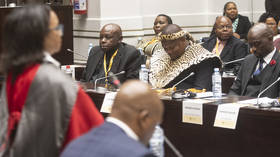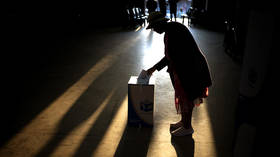South African opposition MPs take their oaths after ending boycott

Lawmakers from the South African opposition party uMkhonto weSizwe (MK) have been sworn in at a ceremony in the National Assembly after boycotting the first session, claiming last month’s election was rigged.
Fifty-eight members of the MK, led by former president Jacob Zuma, took their seats in parliament on Tuesday, nearly two weeks after the legislature re-elected the ruling African National Congress (ANC) candidate Cyril Ramaphosa for a second term as president.
In a statement on Monday, the left-wing group said the decision to allow its representatives to take office followed a “period of critical reflection and strategic consultation within the party leadership.”
“We wish to clarify that our decision to take the oath of office does not, in any way, signify an acceptance of the May election results. The MK Party steadfastly maintains that the elections were marred by massive election irregularities, rigging, and outright fraud,” the party stated.
The MK had filed a legal challenge, seeking to block the new National Assembly from holding its inaugural session on June 14. The party, formed late last year, won 15% of the May 29 vote, giving it 58 seats. However, it has insisted that the election was fraudulent, and requested that the Constitutional Court prevent parliament from convening to prevent lawmakers from electing a president until a rerun was organized. The court dismissed the complaint.
Ramaphosa won a new term after his ANC reached a late coalition deal with long-time rival the Democratic Alliance (DA) and other smaller parties. He took office last Wednesday as head of the multi-party Government of National Unity (GNU), which was formed after the ANC lost its parliamentary majority in the May 29 elections.
The ANC, in power for the three decades since the abolition of Apartheid, received only 40% of the vote in the May general election. The party won 159 seats in the 400-member assembly, down from 230. The center-right DA, South Africa’s second-largest party, with support from the white minority, won 87 seats.
The Zuma-led MK party has said it will join the “Progressive Caucus,” an alliance that holds almost 30% of seats in the National Assembly and includes the radical Economic Freedom Fighters (EFF), to oppose Ramaphosa’s unity government. The Government of National Unity currently consists of ten parties and controls more than 70% (287) of parliamentary seats, according to an ANC statement on Monday.
The MK party maintained on Tuesday that it does not recognize the legitimacy of the previous parliamentary sitting that resulted in the formation of the “treacherous and unholy coalition between Ramaphosa-ANC and DA.” The GNU, according to MK, “poses a significant threat to the hard-earned freedoms of our people.”
“Our team is committed to tirelessly exposing the covert operations of the DANC coalition, which we view as a pet-project of white monopoly capital,” it warned.













